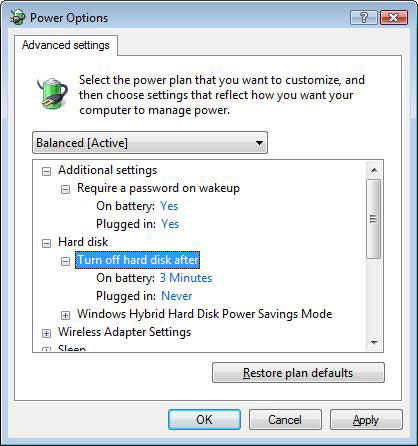Investigating Intel's Turbo Memory: Does it really work?
by Anand Lal Shimpi on June 19, 2007 3:39 PM EST- Posted in
- Laptops
Problem 3: Keeping that drive spun down
The final issue we had to address before we could even begin to look at how Turbo Memory impacted battery life was how to test the platform. Turbo Memory requires Windows Vista, as it piggybacks on two Vista technologies (ReadyDrive and ReadyBoost) but unfortunately most of our battery life benchmarks don't work under the OS.
We instead turned to some of our usual performance tests and with a few modifications, turned them into battery life measurements. By looping SYSMark 2007, WorldBench 6 and various other tests we were able to create meaningful test scenarios that ran the battery down in a repeatable manner, where Turbo Memory had a chance to work.

When testing Turbo Memory, Intel recommends reducing the HDD spin down timer to its minimum allowable setting, which is 1 minute under Vista. We opted for a more reasonable setting of 3 minutes, but also looked at results with the timer set to 1 minute to see if it impacted battery life at all. We found that the difference in battery life with Turbo Memory enabled between the timer set to 3 minutes vs. 1 minute was negligible at best, a couple of minutes was the largest difference we saw in our tests.










31 Comments
View All Comments
SilthDraeth - Wednesday, June 20, 2007 - link
NVM. I think I understand. The "Windows XP startup" is a test that "PCMark '05" runs.Thanks.
DigitalFreak - Wednesday, June 20, 2007 - link
They really should have dedicated the entire 1GB to ReadyDrive instead of splitting it.Nighteye2 - Tuesday, June 19, 2007 - link
I miss the test of readyboost at 2GB of memory. Does the technology still improve performance even when you have a lot of memory?Azsen - Tuesday, June 19, 2007 - link
It does sound like Microsoft need to rework the code for Readyboost and Turbo memory to make use of the extra flash memory more. From the benchmarks it doesn't look like it's being used to its full potential at all. They also need to rework the code so it's enabled after one reboot, not a whole lot of reboots. That's shocking.androticus - Tuesday, June 19, 2007 - link
A technology so persnickety, complicated, and without any significant real world benefits and often just more slowdowns is a total loser!And 512M of cache supposed to in any way adequately cover the huge hard disks of today? Including swap file?
yzkbug - Tuesday, June 19, 2007 - link
My take is to go with a flash-based hard-drive (when prices come down). It should give all benefits that the Turbo Memory was supposed to bring: drain less power and have quick random seeks.Roy2001 - Tuesday, June 19, 2007 - link
Agree.Pirks - Tuesday, June 19, 2007 - link
this poor soul together with his lover beenthere would just jump from joy reading this article. expect usual assortment of MICROSUCKS and INTEL SCAM and shit like that.what's the most funny here is that this is the only case where he would be pretty close to truth, ain't that amusing huh
pnyffeler - Tuesday, June 19, 2007 - link
While I may agree that the impact is minimal, you still have to tip your hat to Intel. Power saving in laptops is probably not going to see revolutionary changes. While 5-10% may not seem like much, it's better than not having it.Besides, what's to say that the impact might be much larger with a larger cache. You could argue that at the extreme end, the longest the battery life could be extended to would be if there was no hard drive at all, just the flash drive. If that were true, then the max the battery life could be under this scheme is the battery life with only a flash drive. How does that compare to these numbers?
And finally, what gives with only 1 GB of flash? If an iPod with 8GB of flash costs $250, I'd pay that much for 8 GB in my laptop if it would make a big enough difference.
TA152H - Tuesday, June 19, 2007 - link
Anand,You're missing something quite significant on ReadyBoost. You talk about adding another gigabyte of memory like there is only a financial cost involved, but this isn't so. If you add more memory to laptop, you use more power, emit more heat, etc... If you can get similar performance for a part that uses less power (it would be interested to know how much power it does use), you extend battery life as well as save money, and don't suffer a huge performance penalty. So, it's actually quite useful.